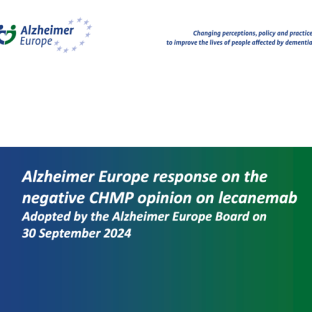On 26 July 2024, the Committee for Medicinal Products for Human use (CHMP) of the European Medicines Agency (EMA) issued a negative opinion on the marketing authorisation application of Eisai for lecanemab for the treatment of early Alzheimer’s disease. In its opinion, the CHMP identified the risk of amyloid-related imaging abnormalities (also known as ARIA) as a major issue. In particular, the CHMP was concerned by the elevated risk of ARIA in people with two copies of the Apo-Eε4 gene. The CHMP concluded that the benefits of lecanemab in slowing cognitive decline did not outweigh the risks of serious adverse events.
The negative opinion came as a disappointment to the AD community, which had high expectations about the introduction of new treatments in Europe. Alzheimer Europe regrets the negative opinion from the CHMP and hopes that the re-examination will result in a decision that will allow people with early AD in the European Union, Iceland, Liechtenstein and Norway to access treatment options available in other countries, with stringent eligibility criteria and efficient monitoring of side effects to ensure patient safety.
Following on from the CHMP opinion, Alzheimer Europe has engaged in discussions with its member organisations, Working Groups and other members of the dementia community, developing an official response to the opinion outlining key concerns and a call to action. The response, which was shared with Emer Cooke, the Executive Director of EMA, and members of the CHMP on 11 October, identifies six key areas of concern for Alzheimer Europe:
- Excluding European patients from treatments available in other countries risks exacerbating inequity. The CHMP opinion is at odds with the decisions by regulatory authorities in the United States, Japan, China, South Korea, Hong Kong, Israel, the United Arab Emirates and the United Kingdom, which means that wealthier patients may seek treatment abroad; creating disparities, and worsening health inequalities.
- Excluding all patients from anti-amyloid treatments restricts patients’ autonomy and reduces choice. Patients and their families deserve the right to engage in discussions with their physicians, to make informed decisions about treatment based on their individual circumstances, preferences and values.
- Risk management approaches, including restriction of eligibility and monitoring, are feasible and available. Alzheimer Europe welcomes the approach by the CHMP to highlight the safety concerns for anti-amyloid treatments. Regulatory authorities that have approved lecanemab shared these concerns and have therefore incorporated robust risk management measures, ensuring that those who may benefit most are not unduly denied treatment options, whilst protecting individuals who are at greatest risk of ARIA and other side-effects.
- Despite the safety concerns, anti-amyloid therapies can provide meaningful benefits to patients and carers. The Clarity AD trial met all its primary and secondary endpoints, with modest reductions in clinical decline on scales such as CDR-SB and ADAS-Cog14. Lecanemab treatment was also associated with a preservation of health-related quality of life on the EQ-5D-5L and QOL-AD scales, measures that are often deemed to be more meaningful for patients and carers.
- The availability of disease-modifying treatments could support the improvement of clinical pathways for care and treatment. In the absence of an approved disease-modifying treatment for AD, European healthcare systems may have fewer incentives to adapt and improve, reducing access to a timely diagnosis that will further disadvantage people with AD and other forms of dementia in Europe.
- A negative regulatory decision risks reducing the attractiveness of Europe as a centre for research and development. Although Europe remains an important region for clinical trials, a majority of studies are conducted in the US, with 112 active trials compared to fewer than 50 in Europe. A negative decision may impede the momentum of ongoing research, prompting companies to deprioritise Europe as a location for clinical trials.
In its response to the EMA, Alzheimer Europe acknowledges the very real safety risks associated with treatment and indicates that it would welcome a restriction to the indication of lecanemab to exclude those at greatest risk of ARIA, such as individuals carrying two copies of the ApoEε4 gene and those receiving treatment with anticoagulants. Alzheimer Europe also calls on the CHMP to require drug manufacturers to develop risk management plans that include controlled access programmes, balancing access to innovative treatments with rigorous safety oversight. Moreover, Alzheimer Europe calls for the establishment of post-authorisation safety studies and patient registries for long-term collection of real-world evidence on lecanemab and other anti-amyloid drugs, including outcomes that are meaningful for patients and their carers.
Download our full response to the CHMP decision below:
